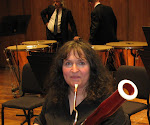In case there's any confusion around what I mean by "maintenance", routine maintenance on a bassoon usually involves re-seating or replacement of pads as needed; replacement of worn felts, cork stops and guide post tape; re-corking of bocal; adjustment, tightening and regulation of mechanisms; application of grease and oil; and general cleaning of the instrument.
A few years ago my very highly regarded bassoon repairman retired, and I wasn't at all sure what to do after that. I asked around about other repairmen and received a variety of responses. I'm pretty fussy about my equipment and I really liked the current state of my bassoon, but eventually I'd have to have it serviced again, right? It seemed to be working just fine, but how long could I continue to deny the fact that I no longer have a repairman (and my bassoon is no longer receiving maintenance)?
In early December a good friend, also a bassoonist, offered to take me along on his next appointment at Paul Nordby Bassoon Repair in Indianapolis. This friend said he needed work done on his bassoon, but hey, maybe I should bring mine along too, you know, just in case......(he understood my trepidation about switching repairmen and was trying to help). After initially rejecting the idea, eventually I set my fears aside and went along with it. Long story short, Paul Nordby accomplished something which I didn't know could be accomplished - he basically overhauled my bassoon during one 5-hour sitting. And I watched, hovering like a helicopter parent. He totally disassembled my bassoon while maintaining conversation (something I couldn't have done for all the tea in China....in fact, I could barely converse while only observing).
The true test occurred a week later, unexpectedly. The day after the trip to Indianapolis, the Columbus Symphony began rehearsing for Holiday Pops. Unfortunately there weren't any real bassoon solos on the program so I couldn't tell much. But the next week, we began our lengthy Nutcracker run.
Now, I've played the Nutcracker a few times in my day......untold hundreds. (I wish I'd kept track.) The Nutcracker proved very valuable for determining the difference in my bassoon resulting from its recent maintenance. As many bassoonists know, there are some challenges in the first bassoon part of the Nutcracker. This is one that comes to mind:
During the rehearsal I was shocked to find out that this passage was 10 times easier than it's ever been before. What had changed? The only changed factor was the maintenance performed on my bassoon. I guess it's reasonable to conclude that difficult technical passages benefit from a bassoon which is operating as well as it can mechanically. Maybe that's why Paul mentioned a bassoonist who always came to see him right before important performances.
While in Indianapolis I was shocked by what came out of my tone holes.....I thought I did a really good job of keeping my bassoon clean. So how on earth did debris end up in the tone holes? I'm baffled. I became understandably nervous as I anticipated the intonation changes which would surely result from the tone holes being suddenly cleaned out, but once I played the instrument I forgot all about that.....until I played the Nutcracker. Now, my bassoon has always played pretty well in tune, but I'll admit that I always had to fuss with the D above middle C, the one held out for a few measures in the middle of the Arabian Dance. After Paul Nordby's cleaning of the tone holes, the D came out in tune without tweaking. And it cooperated nicely on the long diminuendo.
So this is why we maintain our bassoons. If we really want them to function as the manufacturer intended (Paul quipped that he doubted that Heckel intended the instrument to be played with debris in the tone holes) then constant maintenance is necessary.
Now the only problem was that the Nutcracker became almost boring without all those challenges caused by a less-than-optimally-functioning bassoon.......







